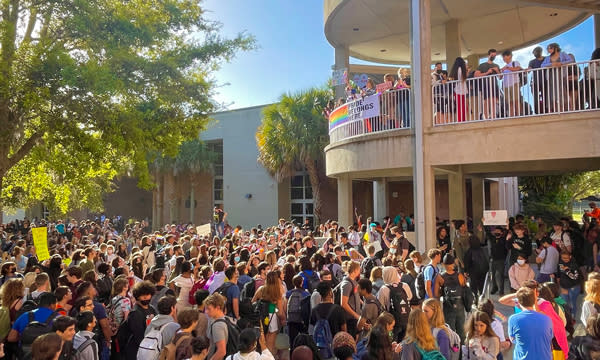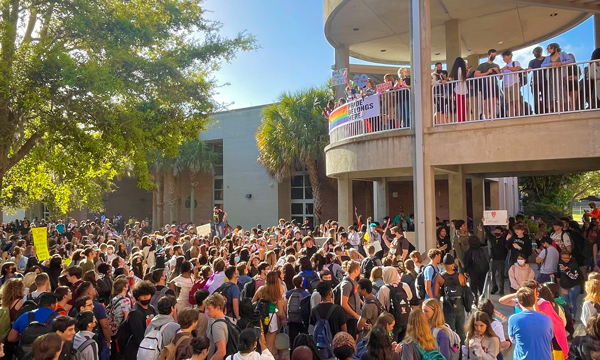
On April 21, thousands of students across Florida walked out of their classrooms to protest Governor Ron DeSantis’ education policies. Coincidentally, two days after the state board of education approved the extension of its “Don’t Say Gay” law to the 12th grade, the demonstration included at least 300 high schools and 90% of the state’s colleges – including all historic black colleges and universities – according to the youth-led group Walkout 2 Learn.
“It was an incredibly powerful moment,” said Zander Moricz, a recent Florida high school graduate and prosecutor in a lawsuit against the law. “We had thousands of students sign a pledge to vote and take a banned history class.”
The law, passed last year by the Florida legislature, banned class discussions of sexual orientation and gender identity in grades K-3 and required all instruction in senior classes to be “age appropriate.” The recent extension to a wholesale ban across all walks of life was one of many resolutions passed by the board at the behest of the governor. It can only enter into force after a 30-day “procedural notice” period.
Get stories like this delivered straight to your inbox. Sign up for the 74 newsletter
This wasn’t the first time DeSantis implemented measures targeting LGBTQ Florians and people of color rather than waiting for the legislature to intervene. Earlier this year, he led the Florida Boards of Medicine and Osteopathic Medicine to ban gender-affirming healthcare for trans youth — a move the legislature is now considering enshrining in law.
DeSantis, widely believed to lay the groundwork for a 2024 presidential bid, has said his election as governor proves he has a mandate to make unilateral policy decisions, which lawmakers can later confirm or — highly unlikely in a GOP Dominated State – Undo. Similar uses of executive power by governors and attorneys general occur in numerous states.
He has also restricted education on topics related to race, banned Advanced Placement African American history classes, and announced plans to rid Florida colleges and universities of diversity efforts and education related to critical race theory.
While DeSantis and his backers had said the ban on discussions of LGBTQ topics in first grade was necessary to protect young children from inappropriate material, state officials said last week’s extension to all students was necessary to ensure that teachers not stray from instructions that meet state requirements. academic standards.
The protests, which were followed by community rallies in some places, had a dual purpose, said Moricz, now a 19-year-old freshman at Harvard University. Young people, he says, needed to feel empowered to take action to defend free speech while sending a message to elected officials that young people are watching — and intend to vote.
“There’s a culture of fear in Florida schools right now, and it’s hard for students to shake off,” he says. “The Florida legislature is not listening to parents, teachers and students. This legislature listens to the governor of Florida.”
Students participating in the afternoon strike participated in 20 minutes of organized activities, including a five-minute version of a black history lesson banned by DeSantis. The focus: censorship of historical black and LGBTQ figures. Protesters also registered to vote and wrote letters to school administrators and other officials promising to work to elect candidates who support student rights.
It was important to ensure that the student protesters could achieve immediate and tangible results, such as the pledge of voting and the opportunity to enroll in an online college-level black history class created by Harvard faculty who had helped create developing the banned AP course. giving them an idea of their potential power, says Moricz.
“Young people in Florida are strategically and intentionally taking back the state,” he says, “and in the process we protect each other.”
Moricz, a founding member of the 2,000-member Social Equity Through Education Alliance, received immediate acclaim a year ago when he was warned not to say gay in his speech at the Pine View School for the Gifted in Osprey, Florida.
Moricz, who is gay, said his microphone would be turned off if he mentioned his role as plaintiff, and gave a speech about coming out as curly hair.
“I used to hate my curls,” he said, taking off his beret. “I was ashamed of them mornings and nights, desperately trying to straighten out this part of who I am.
“But the daily damage of trying to fix myself became too much to bear. So while having curly hair in Florida is hard – because of the humidity – I decided to be proud of who I was and started going to school as my authentic self.
After the speech went viral, Moricz was invited to perform Good morning America.
Walkout 2 Learn leveraged a number of youth-friendly technologies to organize students across the state. For example, participants received instructions by text message on the day of the protest and are kept informed of the group’s work via a Slack channel. Those who independently complete the online Black History class earn a certification to be placed on college applications.
“Don’t worry,” advises the website, “if your school threatens to punish you, we have lawyers and politicians who will support you.”

